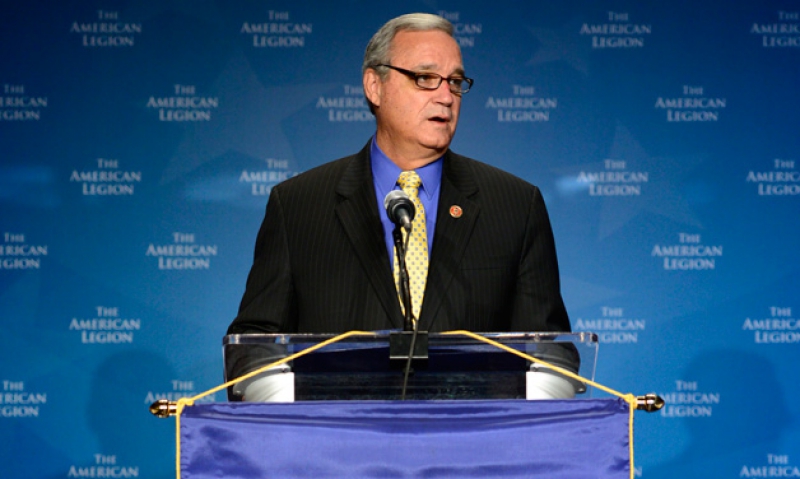
Chairman of House Committee on Veterans’ Affairs says party politics can’t stand in way of VA’s top priorities: the backlog and mental health.
The chairman of the House Committee on Veterans’ Affairs promised members of The American Legion Tuesday that lawmakers and the administration are unified in their commitment, regardless of party affiliation, to reverse the growing backlog of undecided benefits claims and to provide better access to mental health services.
“Despite living in the middle of probably one of the most polarizing political climates that we have seen in our nation’s history, I can tell you... we will work together,” said Rep. Jeff Miller, R-Fla., chairman of the committee. “It is a common cause that we can rally around as members of the United States Congress. It transcends party politics.”
Speaking before hundreds of American Legion members gathered for the 53rd Washington Conference, Miller said VA faces many challenges as troops come home from war and discharge into civilian life with more complex health-care issues than ever before. That is why it is imperative, he explained, that VA solve the backlog problem and provide better access to mental health providers.
The chairman called for VA to “formulate a realistic plan” and not set overly optimistic projections to reduce the backlog of pending benefits claims, which is now estimated to be about 1 million, averaging over 270 days between application and decision.
“We, as a committee, both in the House and the Senate, are making a top priority to ensure that VA resolves the problem,” Miller said. “(VA Secretary Eric Shinseki) wants to resolve it. We want to solve it. You want to solve it.”
Miller said it will take a dedicated workforce to make such a plan successful. “Fortunately, VA has some very dedicated employees,” Miller said. “More than 300,000 people go to work every day at the Department of Veterans Affairs. Most are hard-working. Some are not. As with any organization, a small contingent of problematic employees can do a lot to hinder progress. For too long, this has been the case for the Department of Veterans Affairs. Problematic employees have simply been transferred from one regional office to another.”
He said that when VA chooses to transfer rather than terminate unproductive employees, the backlog grows. “When employees know that the only penalty for consistently failing to meet standards is transfer to another office, they can’t help but become complacent,” Miller explained. “It’s time to end that culture. It’s time to develop among VA’s employees a culture of accountability throughout every corner of the organization. If a VA employee doesn’t want to do the job, the answer isn’t to move them from one office to another. The answer is to remove them, period.”
Mental health care also ranks high on the chairman’s priority list as the 113th Congress gets underway. He said too many veterans are not getting timely services from VA and are being improperly diagnosed. “Even though we will never be able assure timely and effective mental-health care treatment for all of society, I will say that it’s our duty to afford that opportunity to our veterans who are in need.”
Miller noted that VA increased mental health care staffing by 40 percent last year. “Unfortunately, those significant increases have not resulted in significant outcomes. While the number of veterans seeking VA mental health has most certainly grown over the last decade, one number has stayed constant during that time: veteran suicides. For the past 12 years, 18 to 20 veterans per day have chosen to take their own lives. Any time a veteran who fought our enemies abroad and helped defend America from within our borders dies from their own hand, it’s completely unacceptable. It’s not enough that the veteran suicide problem isn’t getting any worse. It isn’t getting any better.”
He said veterans cannot be asked to wait an average of 50 days before getting an evaluation with a VA mental-health provider. “It takes courage for those veterans to stand up and ask for help,” Miller said. “They deserve more than to be told to stand in line.”
Access to care can be expanded, he explained, if veterans who can’t get timely help from VA are given the ability to tap into the TRICARE network of providers. “This is not about supplanting the VA health-care system,” he said. “This is about supporting the VA health-care system.”
The challenges faced by VA – which has been promised protections from the major federal budget cuts of sequestration – can only be overcome through bipartisan leadership and open lines of communication with The American Legion and the veterans it serves, Miller said.
“I have pledged to work with the president and those in his administration,” Miller said. “Your needs are too pressing, and your challenges are too great, to be inhibited by partisanship on the Hill. It’s the same approach that has enabled The American Legion to serve as a great resource and a trusted ally, and as a critical support structure for our nation’s veterans.
“Without a doubt, it’s going to take a collective effort.”
- Washington Conference

